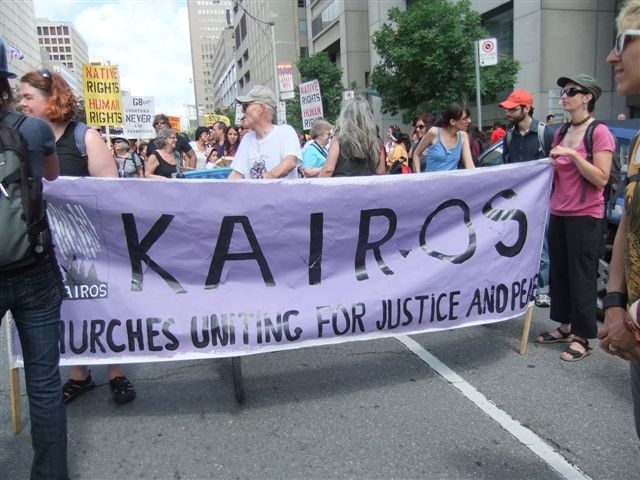To Build and to Plant – a reflection by Rev. Brian McIntosh
Theological Reflection – Sunday, 3 February, 2013
The Reverend Brian McIntosh is the staff team leader at Bloordale United Church in Etobicoke, ON. He is currently the national Co-Chair of the United Network for a Just Peace in Palestine and Israel (UNJPPI), is a trained Ambassador of Reconciliation seeking to educate people about and support the work of the Truth and Reconciliation Commission of Canada, and is the Chairperson of the Social Justice and World Affairs Committee of South West Presbytery.
Jeremiah is surely the only biblical figure with a word coined after him: a jeremiad is a prolonged denunciation or complaint, and that alone tells you a lot about this late seventh and early sixth century BCE prophet. The reading for Feb. 3rd, Jeremiah 1: 4-10, is the story of his call, an exemplary and constitutive narrative of uncommon encouragement to become God’s messenger that is the first of two such calls in consecutive lectionary weeks, Isaiah’s equally rich and textually thick call in chapter six coming the following week. The call comes at the beginning of a critical and formative time in Israel’s history, as the prophet’s life will overlap the devastating destruction of Jerusalem by the foreign empire Babylon in 587 BCE and the aftermath of loss, deportation and exile to follow.
If a prophet, then or now, is to be an effective poet and preacher as God’s mouthpiece – God’s hand actually touches Jeremiah’s mouth in verse 9, thus marking him as a Mosaic prophet (see Deuteronomy 18: 18) – both denunciation and annunciation are necessary. Yet while this text includes inklings of Jeremiah being commissioned to do both – “See, I have set you this day over nations and over kingdoms, to pluck up and to break down, to destroy and to overthrow, to build and to plant” (verse 10) – the overbearing weight of Jeremiah’s burden is to denounce Israel, particularly its powerful and privileged, as having failed to live up to God’s will and way – and to an even larger degree than the two-thirds of these couplets indicate!
A priest’s son, this young prophet was from an unnoticed village, a poetic nobody with few credentials and what seemed like a chip on his shoulder, a chip that turned out to be the size of God’s conscience, whom the Jerusalem elites thought they could safely ignore. But Jeremiah, nonetheless, raged against the privileged entitlements of the establishment powerbrokers with rare courage and conviction, the trajectory of his time linking the largely urban leadership with rootless profiteering, exploitation, forced labor, corruption and the dangerous and, ultimately, false assumption of not only God’s abiding presence but God’s unabashed favor. He indicted Jerusalem for disobedience of God’s Torah, and sentenced the city’s leadership to punishments that were but consequences of that disobedience – oh that our North American urban elites were to hear and, better, heed such warnings today!
All of this is somewhat foreshadowed in the language of his call, astonishing in its clarity. Immediately in verse 5, God is affirmed to be the one to remind Jeremiah of his divine formation in his mother’s womb, his pre-birth consecration to a future sacred purpose, and his prior appointment as a prophet of justice. Then, as Jeremiah pleads youthful inarticulate ignorance in verse 6, God grows almost exasperated in verse 7, as if to say, in declarative tone, “I’ve been ignored enough by the economic beneficiaries of my people’s pain, and I will not be dismissed so easily any longer! Don’t tell me you won’t speak just because you’re young and inexperienced, because you’ll go if I say you’ll go to speak what I say you’ll speak.” The divine word is a more reassuring one in verse 8, however, as the mystery of God’s presence is promised to help the prophet overcome the fear he obviously feels.
The young Jeremiah, even if anxious, was called to overcome his fear of being on the outside of privilege looking in, and, taking our cue from his call, surely we in our time, in the corridors of power and in the church, are also called to overcome our similar fears, in the midst of imperial privilege, and be the endlessly courageous custodians of the divine prophetic impulse, denouncing power arrangements in which the absurdly rich rule over the rest (see “Billionaires had a great 2012” in the Toronto Star, Thursday January 3, 2013); in which colonialism’s more subtle but still chauvinistic son oppresses indigenous peoples by covert process if not by overt power (surely the reason for IdleNoMore); in which foreign policy aims are accomplished more often by imperial decree and military might than by the political arts of compromise and negotiation; and in which white racism, of which we are reminded again in the beginning of black history month, is alive and at large in corporate culture. In such a still imperial and sin-sick time the church, which once used to so often lead the prophetic way in public life, having learned of prophecy’s poetic potential to turn the powers-that-be upside down from its original religious mentor, Judaism (see Marc Ellis, Judaism Does Not Equal Israel: The Rebirth of the Jewish Prophetic, among others), as well as from its center and source, the Jewish Jesus, are called to denounce such practices, despite our contemporary fears of disestablishment, and announce God’s promise to “build and plant” a just peace in the midst of God’s people and in all the places of God’s creation.








